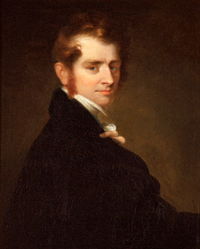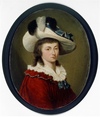
Source: Courtesy of Wikimedia Commons
ROEBUCK, JOHN ARTHUR, politician; b. 28 Dec. 1802 at Madras, India, fifth son of Ebenezer Roebuck, civil administrator in India, and Zipporah Tickell; d. 30 Nov. 1879 in London, Eng. In 1834 he married Henrietta Falconer, who, with a daughter, survived him.
On his father’s early death, John Arthur Roebuck’s mother took him to England in 1807; she made a second marriage there to John Simpson and members of the family emigrated to Upper Canada in 1815, where they initially owned an estate at Augusta, on the St Lawrence between Prescott and Brockville. In 1824 John Arthur returned to England and entered the Inner Temple, being called to the bar in 1831 and eventually appointed qc in 1843. He became mp for Bath in 1832 and, as a disciple of Jeremy Bentham, adopted radical views, supporting vote by ballot, an elective magistracy, a national system of secular education, disestablishment of the Church of England, the removal of all civil and religious disabilities, and a reduction in the powers of the House of Lords. Although his radicalism mellowed in later years, he remained strongly out of sympathy with the Whigs, denouncing them as an exclusive aristocratic faction that insincerely employed democratic slogans for party purposes.
In 1834 Roebuck moved in the House of Commons for the appointment of the committee which inquired into the affairs of Canada in that year. He did not speak on Canadian affairs on any other occasion between 1832 and 1835, when, perhaps because of Louis-Joseph Papineau’s connection with the radical Joseph Hume, he became agent in England for the assembly of Lower Canada, and, acting in effect as Papineau’s personal representative, advanced in parliament and in the press the demands of the Canadian reformers for an elective legislative council and for local control over all provincial revenues and crown lands. Despite Papineau’s appreciation of his efforts, the assembly did not meet his expenses and a debt lasted for some years. One of a small group of outspoken radicals, Roebuck vigorously condemned Whig policy towards Canada as embodied in Lord John Russell’s resolutions in March 1837, and, though he had lost his parliamentary seat in an election later that year and was no longer Lower Canada’s agent, he was allowed in 1838 to speak at the bar of both houses in opposition to the bill to suspend the Canadian constitution. Roebuck never doubted the value of colonies to Britain, but he demanded the reform of the existing system of imperial administration at home and overseas. Fearing also the annexation of the Canadian provinces by the United States, he advocated that Britain grant the colonists a greater degree of self-government and form a North American federation, views he set out in The colonies of England, published in 1849.
Roebuck was again returned to parliament by Bath, 1841–47, and by Sheffield, 1849–68 and 1874–79. In 1855 he was appointed chairman of a parliamentary select committee whose report condemned ministerial incompetence in the conduct of the Crimean War. To the annoyance of his friends and supporters, he championed the south in the American Civil War and defended Austrian rule in Italy. In 1878 he was made a privy councillor by a Conservative government.
Roebuck, short in stature, was self-confident and impulsive in expressing his opinions. The destructive criticism and bitter invective of his speeches were appreciated more by popular audiences than by the House of Commons, where the strength of his language tended to harm rather than promote the causes he espoused and his irritability was reputed to be more in evidence than his undoubted intellectual powers. His independence of party ties and conscientious exposure of shams and abuses suggested to the English public a person of great integrity, but he remained one of the most wayward politicians of his time.
J. A. Roebuck, The colonies of England: a plan for the government of some portion of our colonial possessions (London, 1849); History of the Whig ministry of 1830 to the passing of the Reform bill (2v., London, 1852); [ ] Life and letters of John Arthur Roebuck . . . , ed. R. E. Leader (London and New York, 1897); Radical support to a Whig ministry (n.p., 1836). Pamphlets for the people, ed. J. A. Roebuck (2v., London, 1835)PAC, MG 24, A19 (Roebuck papers), 1. Times (London), 1 Dec. 1879. DNB.
© 1972–2024 University of Toronto/Université Laval
Image Gallery


Cite This Article
Peter Burroughs, “ROEBUCK, JOHN ARTHUR,” in Dictionary of Canadian Biography, vol. 10, University of Toronto/Université Laval, 2003–, accessed April 16, 2024, http://www.biographi.ca/en/bio/roebuck_john_arthur_10E.html.
The citation above shows the format for footnotes and endnotes according to the Chicago manual of style (16th edition). Information to be used in other citation formats:
| Permalink: | http://www.biographi.ca/en/bio/roebuck_john_arthur_10E.html |
| Author of Article: | Peter Burroughs |
| Title of Article: | ROEBUCK, JOHN ARTHUR |
| Publication Name: | Dictionary of Canadian Biography, vol. 10 |
| Publisher: | University of Toronto/Université Laval |
| Year of publication: | 1972 |
| Year of revision: | 1972 |
| Access Date: | April 16, 2024 |
















